- Home
- P. T. Deutermann
SPIDER MOUNTAIN Page 13
SPIDER MOUNTAIN Read online
Page 13
“This is one of the Park Service ranger cabins,” she told me when I got out. “Except the DEA’s had it requisitioned for the past year. Occasionally the SBI gets joint use.”
“For that investigation that isn’t going on?” I asked. The cabin was perhaps twenty-five feet square, with wraparound porches and a stone chimney at one end. The dogs ran around, Frick checking out the new surroundings, Frack insulting trees.
“Possibly. Come on inside.”
“Presumably there’s no one home right now?” I asked, as she unlocked the front door, barged right in, and started turning on lights. I half-expected a sleepy DEA agent to come stumbling out, gun in hand. There was a single large room, a small loft, and a kitchen-dining room combination occupying the left back corner. There was a bunkroom and a bath in the opposite back corner. A table was set up next to the fireplace, which was covered with wireless communications gear, cell phone chargers, and a desktop PC.
“There are basic provisions in the cupboards,” she said, “and I’ll bring you some fresh stuff once the stores open. But for right now, you’re legally on a federal reservation.”
“And theoretically, county cops have no jurisdiction here.”
“Unless the Park Service accommodates them, which it won’t once I get to someone at their district HQ over in Gatlinburg. You are going to play ball, right?”
“Only if you were serious about the decoder ring,” I said, and she grinned. We both knew that, at the moment anyway, I had little choice but to take their deal.
“Great,” she said. “Why don’t you make us some coffee, and I’ll explain what we need from you.”
She went back out to her car to get her briefcase while I loaded a Mr. Coffee machine I found on the kitchen counter. Carrie came back in and produced a contract and some credentials she had had made up identifying me as an authorized operational consultant for the North Carolina SBI. Over coffee she explained what the SBI wanted me to do.
“We’d like you to go back into Robbins County, on foot, and do a few days’ worth of physical reconnaissance.”
“The Creigh place again?”
“No,” she said. “The hollows around the Creigh place. There are several smaller communities up there—cabins, trailers, even some substantial homes, within five miles of the Creigh place. Some of those people have to be working for them, but there are other people up there who have nothing to do with the Creighs. Retirees on government or coalfield pensions, tenth-generation welfare rednecks composting in their trailers, good old boys with hunting pens.”
“And bad guys, too.”
“Oh, yes: the bootleggers, marijuana farmers, psycho-mushroom pickers, and, of course, the meth mechanics.”
“You guys have a database for the area?”
“ATF does, but they know it’s woefully deficient. Every time feds go up there, Robbins County deputies go along and, they suspect, call ahead. Everyone of interest just clams up. The regular citizens either don’t know or are afraid to run their mouths, and sometimes they’re just loyal to their hills and hollows and won’t talk to outsiders, period. DEA has had the same experience, and the Bureau has flat given up.”
“What makes you think I won’t get the same treatment?”
“Outside law has always come in crowds; we are going to be a couple of hikers.”
I put down my coffee mug. “We?”
“Oh, didn’t I tell you?” she asked brightly. “I’m coming along.” She started laughing when she saw the expression on my face.
“Oka-a-ay,” I said. “But now you have to tell me what this is really all about, because it’s obviously bigger than drugs.”
“I have a better idea,” she said. “We’ll go up there and look around. After a few days, we’ll back out, and then I think you’ll be able to tell me what this is all about. That way I won’t taint your conclusions.”
“We’re just going to walk the hills and dales, go knocking on people’s doors, talk nice to the moonshiners when we stumble on their stills, evade any of Mingo’s deputies who happen to live out there in some of these houses, and keep telling ourselves that Grinny Creigh won’t find out we’re up there?”
“Something like that, yes,” she said. “Look: We’ve got all the aerial photography, topo maps, suspected smuggling routes, IR plume shots of supposedly abandoned shacks and trailers that go hot at night, arrest trends with links back to Robbins County, in other words, tons of data. What we don’t have is any HUMINT—human source ground truth.”
“But why not? The feds have certainly been looking.”
“Basically, none of the alphabets has ever been able to get probable cause to do search and seizure because M. C. Mingo undoes their every attempt, one way or another. That’s why the feds came to us in the first place. Plus, they’ve been totally unable to get anyone undercover because the bad guys, one, are all related and, two, have known each other since the Blue Ridge first turned blue.”
“The feds want to break up a drug ring, and the SBI wants to clean out a dirty sheriff’s office,” I said. “Seems like a match made in cop heaven. Why not declare them all suspected terrorists and take them down to Guantánamo for a year or so? Hit ’em so hard they can’t recover for a few generations.”
“Because,” she said patiently, “the government is already under siege by lawyers and civil rights activists over the detention of real live car-bombing, throat-slitting, Koran-thumping Muslim fanatics. These people are, for better or for worse, Americans.”
“So are the Crips and the Bloods, but the feds walk all over those guys from time to time, if only to thin ’em out.”
“The feds have people inside those operations. Real-time intelligence. Major deals they can rumble and then seize. Up here, these people are making the shit in caves and the tunnels of old mines. Everyone’s kin. You piss off the boss and you get eaten by dogs, right?”
“And why me, again?” I asked.
“A couple of reasons,” she said, finishing her coffee. “One, you’ve been up there and made it back. Two, you’ve seen some of the players up close and personal. And, three—well, I can’t tell you that one. Yet.”
I stood up and walked around the cabin’s main room. “And, three, as a consultant, if things go really wrong, the SBI can deny me three times before sunrise and keep its bureaucratic skirts clean.”
“Such a cynic,” she said. “We’re not that clever.”
“Oh, right. Okay, try this: Three, I’m officially a fugitive from a warrant in Robbins County. So if things really go wrong, you can say that you were in pursuit of a fugitive, and that’s why you were up there in the first place.”
“Now you’re talking,” she said, again with a grin. “Consider yourself a target of opportunity. If you can get us what we need, great. If not, we’re no worse off than when we started.”
“Which doesn’t necessarily describe where I’d be.”
“That’s one of the perks of going private,” she said.
I smiled. “Damn, Carrie, you really know how to make a guy feel wanted.”
“Oh, you’re wanted, all right,” she said. “Just call M. C. Mingo.”
I had no reply for that, so I tried to change the subject. “You physically qualified to walk the high country?” I asked. “And run, if necessary?”
“Absolutely,” she said. “And I can climb, too. Straight up rock walls, if I have to. Can you climb?”
“Only if the bear is big enough,” I said. Or the pig, I thought, remembering our little scamper up the pine trees.
“Well, there you go, operational consultant. And if I choose to run, you know the bear rule, right?”
“Yeah, yeah, you don’t have to outrun the bear, you only have to outrun me. Who’s going to handle logistics? You’re not proposing we tote a bunch of supplies, are you?”
“That’s where Mr. Greenberg and his crew come in,” she replied. “They’re going to go ‘camping’ in the national park. We’ll get up with them once a day to r
esupply and to report what we’ve seen.”
“Can they act as cavalry if the need arises?”
“Not legally,” she said. “Which isn’t to say they won’t come. But the whole idea is to put a small team on the ground, not a federal horde.”
I sat back down in one of the chairs. “A whole grunch of questions come to mind here,” I said.
“What can I tell you,” she said, flicking her hair away from her eyes. “You said you liked to go camping.”
We set out late that afternoon. Greenberg and his team had hired Mose Walsh to bring in their camping gear at noon by truck, and then they’d staged everything up to a fire-lane road in the park at the upper end of Crown Lake. From there we could walk down through a pass to a gentle valley that was two ridges over from the Creighs’ home base. The plan was for the pair of us to set up a camp just below the ridge at the head of the valley that evening, and then begin our photo “hike” down the first valley and up the adjacent one, returning to the park boundaries by nightfall. Greenberg and his crew would maintain the base while keeping at least one agent in a position from which he could maintain line-of-sight communications with Carrie and me using DEA tactical radios. Mose would handle resupply on a daily basis.
Carrie and I wore civilian backpacks and field belts, and we each carried a shelter half and a sleeping bag rolled on packs supplied, once again, by Mose Walsh. I had a sport-fisherman’s vest, under which I wore my SIG .45. Carrie carried a weapon I hadn’t seen before, a nasty little number that she called a mamba stick. It looked like and served as a pool-cue-shaped walking stick but could fire up to six .223-caliber bullets with a flick of the wrist. It was part six-shooter, part rifle. To fire it, all she had to do was pick off the tip of the walking stick, ratchet the base end to the left to cock it, point it, and then press a small button to fire each round—basically a single-action bang stick.
I relaxed a little when I saw her decked out in well-worn outdoors clothes and boots. My gear was similarly well broken in; I spent at least two weekends out of each month somewhere in North Carolina either fishing, hunting, or just taking the mutts out for a spin. Once every two hours one of us would open the radio and ask Can you hear me now, aping those ubiquitous Verizon commercials and probably annoying the shit out of the duty DEA comms agent. We set up our first camp alongside a pretty stream in a high meadow. This put us on the eastern boundary of the national park. The entire valley spread out below us, and we hoped to see some lights below us when darkness fell.
It turned out that Carrie did not cook at all. “My father was an excellent cook and wouldn’t tolerate women in the kitchen,” she said. “At least not until dinner was over and there were pots to be washed.”
“How do you survive?” I asked, as we unpacked our stuff.
“I’m a charter member of the nuclear age,” she said. “I buy it, I nuke it, I eat it. Unless I can con some guy to do better.”
“You could con me,” I said. “But then I’m easy.”
She smiled. “Good—you do the honors around the campfire, and I’ll handle what has to happen in the creek.”
“Deal,” I said. I boiled up a cup of rice over the fire and then added a package of dehydrated chili and the required water. In the coals I made some biscuits in a collapsible Dutch oven and then set up a coffeepot on one side of the coals. The shepherds each got a cup of dry kibble, although they made it perfectly clear that chili would have been a much better deal. We ate in contented silence as we watched the sun go down behind the western mountains, throwing the valley below into deeper and deeper shadows.
“This going to be worth the effort?” I asked.
“I think it will, especially if you come to the same conclusions that we have. Then things might get interesting.”
“That tells me a lot,” I said. “I mean, how are we going to play this?”
“We’re photojournalists,” she said. “We’re doing a photographic essay on life in the mountains on the edge of the Great Smokies Park. We meet the people, photograph them if they’ll let us, their houses, their farms, their dogs, and then interview them as to what life’s really like up here in what the maps label as game lands.”
“Eventually we’ll stumble onto one of Grinny’s retainers,” I said. “And then we’re going to have some problems.”
“There are more righteous people down there than you might suspect,” she said, pointing down at the lights that were beginning to twinkle through the trees down the valley. “According to our aerial maps, a dirt road parallels this creek all the way to where it empties into a river. There are maybe two dozen cabins, houses, what have you, along that road. They can’t all work for Grinny Creigh.”
I fished around in my pack for a nylon windbreaker; even in late summer, the air temperature dropped like a stone once the sun went down. “It just takes one,” I said. “And they’ll recognize me, especially with these dogs.”
“Then we do what we have to do,” she said. “By the way, was that a flask I saw in your pack?”
I looked at her. “You’re a pushy broad, aren’t you.”
“You gonna share?”
“Aarrgh,” I said. “I hate sharing.”
“I can talk all night, if you’d like. I can even sing.”
“Of course you can. I’ll get the flask.”
The first place we came to the next morning featured an immaculate stone cottage surrounded by gardens and small alpine pastures in which sheep congregated. The people who lived there were both retired from the postal service and were refreshingly friendly. I noticed that the line of power company poles extended up the dirt road as far as their cottage, so these people were living comfortably in the twenty-first century. It turned out in the course of Carrie’s questions that they had never heard of the Creighs or of any particular crime problem in or around Robbins County. They also seemed to have no problem accepting our photojournalist cover story.
The next three homes down were similar situations, retired people who had always wanted to live in the mountains and enjoy the privacy and rustic beauty of the Smokies. The closer we got to the bottom end of the valley, however, the less appealing the home places were. Log cabins and stone cottages gave way to trailers, and gardens to collections of junked cars and trucks. Up the valley the dogs had been friendly if alert; at the lower end they were chained to trees or old cars and inclined to drooling snarls. I kept the two shepherds on the creek side of the road; the last thing we needed was a dog fight.
The first two trailers we passed seemed to have no one home except for some angry dogs. The third one, an especially nasty pile of rusted metal, with loose trash, a hard-packed dirt yard, and a lone, scabrous two-year-old playing in an abandoned tire, was occupied by a man and woman of indeterminate age. Several dogs could be heard barking from behind the trailer, and they didn’t sound very happy, either. There was an electric power pole in the yard, but the meter base was empty. Carrie sighed as if she’d seen all this before.
I held the shepherds over by the creek bank while Carrie unslung her pack and approached the yard to ask if they’d be interested in being “interviewed.” The man, a paunchy, hairy, and paranoid-looking individual wearing blue-jean overalls and a filthy T-shirt told her to get on out here or he’d set them dogs yonder aloose. The woman, a stringy-haired stick figure whose dark-rimmed raccoon eyes indicated an end-stage addiction of some kind, hung back in the doorway of the trailer, a cigarette dangling from her lips and a vacant expression on her face. The child playing in the dirt never looked up during the entire interchange. Carrie waved and backed off to rejoin me on the other side of the dirt road. The man finally saw the shepherds and reached down to pick up an axe handle. He yelled something else at us, but whatever he said was drowned out by the barking dogs behind the trailer. I walked ten feet behind Carrie, and made sure the shepherds stayed between us and the hostiles.
The next two trailers appeared to be abandoned. The final place had beef cattle and a two-story ninete
enth-century log house, but there was no one at home except for two small collies, who cowered when they saw the German shepherds. The steers looked well fed and the fences were in good order, so it was a working farm. By late afternoon we’d reached the lower end of the valley, where the stream joined a larger one in a pretty waterfall after crossing under a mostly paved one-lane road. There was a perfect campsite on the point formed by the juncture of the two streams, downhill from the paved road and partially hidden behind a stand of stunted pines. It had obviously been used before, based on the blackened ring of stones in the clearing above the streams.
We set up our tents and a small fire and then went to soak tired feet in the cold stream. Our campsite was on the high, western bank of the stream, and we could see a large tree that had fallen across the water about thirty yards upstream. Its top surface had been flattened and there was a single rope handrail, indicating a crossing point for a local footpath. The sun dropped below the ridges behind us at the top of the valley and darkness settled quickly, followed by the temperature. The dogs curled in as close to the hot rocks around the fire as they could.
We had seen fewer people than I’d expected, but there also had been some chained driveways leading back into the woods and slopes where we had elected not to go. I’d let Carrie call the shots as to where we tried and where we simply passed by. She seemed to have a good sense of which was which. I found myself warming to her—she was practical, carried her share of the load, laughed often, and was easy on the eyes. She maintained that quiet reserve I’d observed in many attractive women, who knew full well that men were likely to make assumptions about their character based on looks rather than competence.
That was fine with me. This was not exactly a romantic excursion in the making, and I was still worried about some of the people we’d seen. I kept thinking about that homing dog Nathan had fired down the meadow. I’d also begun to appreciate the problem law enforcement had in coming to grips with criminal enterprises in the mountains; short of bringing in an occupying army, there was no way even to tell how many people actually lived up here. Based on some of the signs we’d seen, the people who’d built homes here valued their privacy and were more than willing to defend it.

 The Nugget
The Nugget The Hooligans
The Hooligans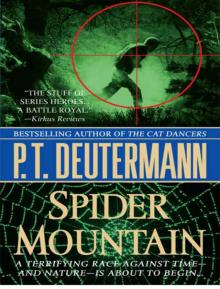 SPIDER MOUNTAIN
SPIDER MOUNTAIN![Cold Frame [retail] Read online](http://i1.bookreadfree.com/i/03/19/cold_frame_retail_preview.jpg) Cold Frame [retail]
Cold Frame [retail] Sweepers
Sweepers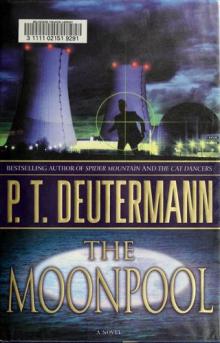 Cam - 03 - The Moonpool
Cam - 03 - The Moonpool Trial by Fire
Trial by Fire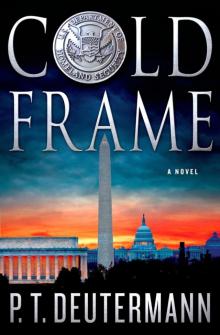 Cold Frame
Cold Frame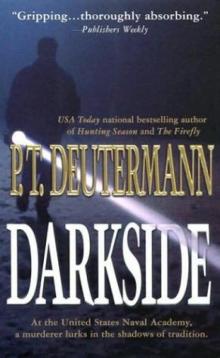 Darkside
Darkside Cam - 04 - Nightwalkers
Cam - 04 - Nightwalkers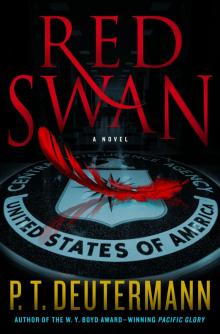 Red Swan
Red Swan The Commodore
The Commodore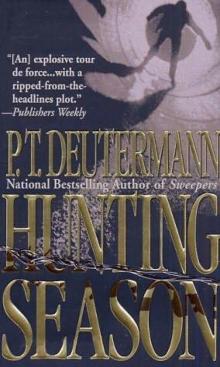 Hunting Season
Hunting Season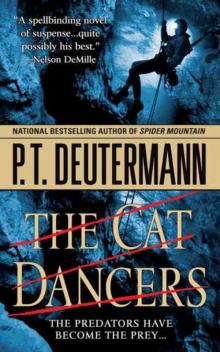 The Cat Dancers
The Cat Dancers Scorpion in the Sea
Scorpion in the Sea The Edge of Honor
The Edge of Honor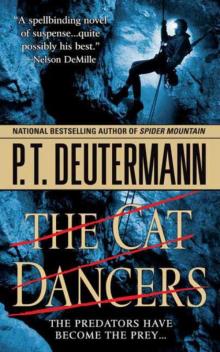 The Cat Dancers cr-1
The Cat Dancers cr-1 The Iceman
The Iceman The Iceman_A Novel
The Iceman_A Novel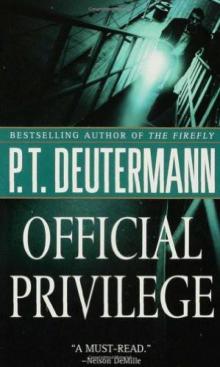 Official Privilege
Official Privilege Sentinels of Fire
Sentinels of Fire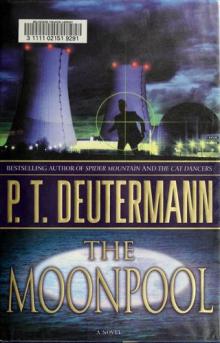 The Moonpool cr-3
The Moonpool cr-3 Nightwalkers cr-4
Nightwalkers cr-4 The Firefly
The Firefly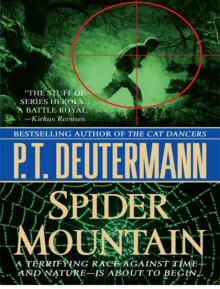 Spider mountain cr-2
Spider mountain cr-2 Pacific Glory
Pacific Glory The Last Man
The Last Man